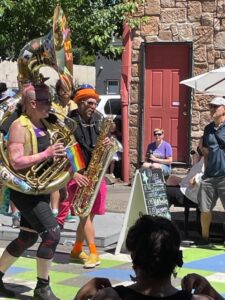 Dave and I just came back from the Portland Honkfest and if that event doesn’t sizzle your tissues on a cellular level, you might be dead. The Honkfest is an all-day celebration of brass bands, none of them professional. These are people who got hooked on honking in school and once they’d graduated, and put away their trumpets and trombones and such, their lives took a slow downward trajectory into jobs and adulthood and tedium and failed love until they realized: Hey. We could still honk if we find someone to honk with. And so bands large and small have pulled together and bloomed like bright little galaxies in the dark of space. And they had space to stomp at the Honkfest.
Dave and I just came back from the Portland Honkfest and if that event doesn’t sizzle your tissues on a cellular level, you might be dead. The Honkfest is an all-day celebration of brass bands, none of them professional. These are people who got hooked on honking in school and once they’d graduated, and put away their trumpets and trombones and such, their lives took a slow downward trajectory into jobs and adulthood and tedium and failed love until they realized: Hey. We could still honk if we find someone to honk with. And so bands large and small have pulled together and bloomed like bright little galaxies in the dark of space. And they had space to stomp at the Honkfest.
Seriously, if you can listen to a brass band without marking yourself 50% happier than you had been just five minutes before, you are either a dog or a baby with an ear infection. Although I suspect the dogs were reacting to the flutists, whom nobody else could hear. I love it all. This is what I’m waiting for during a parade, the marching bands thundering down the street like an injection, propelled by a drum corps plunger.
 And parades in our town feature one horse’s ass decked with flowers after another, a metaphor for politics if I ever saw one. You can have your floats and your princesses and your local lights in polished old convertibles: I want the brass bands. I can be subtle, but sometimes I just want my joy shoved right down my ears’ gullets. And they can do it. A good brass band can ream out your spinal stenosis, clear your sinuses, and relieve your brain of excess rumination.
And parades in our town feature one horse’s ass decked with flowers after another, a metaphor for politics if I ever saw one. You can have your floats and your princesses and your local lights in polished old convertibles: I want the brass bands. I can be subtle, but sometimes I just want my joy shoved right down my ears’ gullets. And they can do it. A good brass band can ream out your spinal stenosis, clear your sinuses, and relieve your brain of excess rumination.
Something about all that hardware going off at once pastes a smile on your face you can still feel hours later, if you’ve let your face get out of shape. I love the tubas and baritone saxes—all the saxophones really. Saxophones always seem like trumpets with a dangling cigarette and a sordid past. They’re naughtiness through a reed. The trombones amaze me. They’re clearly not real. They look unplayable; people probably take up trombone in order to clear out a little personal space for themselves in a marching band. But for my money, which in this case was a voluntary donation, the trumpet can’t be beat. I think I’ve always felt this way.
Because when Mom and Dad asked me if I wanted to learn an instrument other than piano—I was probably six, and all the kids took piano lessons—I said TRUMPET! so quickly and with such enthusiasm that it was clear I intended to shake up the place. In retrospect, I probably could’ve been talked into a clarinet, but I didn’t know about clarinets. I was unclear about the cello, too, because that’s what was (pointedly) suggested to me at the time, but I thought that was related to the bongo, and I wasn’t interested. Honey, I wanted to make some noise.
That wasn’t really my family’s style, though. We were modest folk. No one raised their voice, no one argued, and even scoldings rarely involved more than the dreaded raised eyebrow of correction. When my mom slipped and her ankle bone was poking right through her leg, she didn’t even make a peep. She was from North Dakota: it wasn’t done. The first time I went to a college friend’s home and everyone in her family yelled at each other the whole time, I was terrified. Until I realized that’s just how they talked. Anyway, in my family stringed instruments were preferred. And I can understand why. There’s a reason people talk about “heartstrings” and not “heartbrass.” One is romance. The other is cardiac arrest.
So picture my family as the pot of water put on to boil but never quite getting there. I was always that bubble just about to bloop to the surface. My oldest sister was the same. We were known to bloop together. My family was the pastorale section of the William Tell Overture and Margaret and I were the finale. But you know what? Nobody minded.
People need a little brass.
click for video: https://youtu.be/d7zXCs8HlT4
Brass is great! Bagpipes do that to me, as well.
Me too! Also kilts.
Oh, yeah! On my way home from running errands one day, I passed by a bagpiper wearing a kilt on someone’s lawn with the family surrounding him and listening. I immediately turned around in someone’s driveway, stopped at the house, pulled over and got out, and listened to him as well, even though i was an uninvited guest. Turns out that it was the grandmother’s birthday, and it was around the pandemic, so they were out on the lawn. A magical moment, as I was in my “Scottish phase” around then because of reading/watching Outlander. Made my day.
I am second line, all the way!
Made me look it up. Second-lining! Who knew? Leslie knew.
Oh, yes!
I loved being in the band in high school, though I played clarinet, not brass. Making music in a group is so much more fun!
I missed out. And these days, if I were to take up another instrument, it would be clarinet.
About 66 years ago, my folks asked me the same question – what instrument did I want to learn? I said the same thing. Trumpet. Dad said “Well, how about this instead?” And I ended up playing the french horn. Although I love listening to music, nothing can compare to making it, especially in a group – brass quintet, for me.
French horn is just a trumpet gone a little more polite. Excellent instrument though.
https://www.youtube.com/watch?v=byxWmjkL1oY
Loved this guy.
He sang too.
I played trumpet elementary school and into the start of my freshman year. I’d been good here in NJ, but was outclassed when we moved to Washington State. I was recruited to become a tuba player and played through the rest of high school. I never owned my own tuba, but did own a trumpet. But a tuba player’s lips are not those of a trumpet player and making the trip back to those hard muscled lips just wasn’t in my game plan. I wish I could have afforded my own tuba. That was seriously cool.
Shoot, my brother-in-law just gave away his tuba.
If you’ve never seen it, you should check out a film called Brassed Off. It’s from 1996, starring Pete Postlethwaite and Ewan McGregor. Good working class politics, great brass, and even a bit of romance. Highly recommended for all fans of brass!
Any kilts in it?
Being (as I recall) about Wales, sorry, it’s kiltless. But nevertheless enjoyable.
I love brass bands! I love saxophones and clarinets, but I also love violins and cellos, pianos too. I can’t play a single one of them, but I do love to listen. Bagpipes really stir the heartstrings and men in kilts, oh my!
There’s something for everybody, even if you just play the radio.
In middle school (early 60s), the school band director asked what instrument I wanted to learn. “GIRLS DON’T PLAY SAXOPHONE!” and refused to teach me. Another seed planted in my feminist journey.
So you DID learn something.
Oh, no, how could I miss this? It sounds wonderful. I love me some brass. And in the feel good realm, these brassholes fit the bill: https://www.youtube.com/watch?v=c9MiGCQf1bY
If I danced like that I’d have no breath left for the horn.
To be different, if I were to join a brass band, I’d take up the ophicleide!
https://en.wikipedia.org/wiki/Ophicleide 🤓
New one on me!
Here’s an ophicleide quartet on YouTube playing Mendelsshon / Telemann!
https://www.youtube.com/watch?v=GG5pbPcXnC0
That was SO cool! Thank you!
Re: “There’s a reason people talk about “heartstrings” and not “heartbrass.” One is romance. The other is cardiac arrest.” But hear this:
https://www.youtube.com/watch?v=H4gGKVgUnJE
The exception that proves the rule, perhaps?
With a big boost from the strings!
This was a total gas,from Murr through all the comments. Thanks everyone!
For me it stated with piano, 3 years later organ added on, then a detour to glockenspiel so I could be in marching band too! And right next to the brass, just saying it like it is. I married the nearest trumpet player and, lo and behold, he gave me my first harp!
I’m now playing harp number 3 and our oldest is also a pro harpist.
Pedal harp? I have a Paraguayan, like this (not meaning I could ever play like this): https://www.youtube.com/watch?v=QAQu3qqKEDs
I learned to play 4 on 3, first writing it out and then practicing by tapping on the steering wheel while I was commuting — for months.
Harp is, however, a shitty marching band instrument.
Surprise! It has been done! (Though I would not.) There are Peruvians who carry them in a parade, upside-down.
as in this illustration in a musicological work:
https://www.harpspectrum.org/folk/History_of_Latin_American_Harps_files/image012.jpg
or like the man in this photo, playing while marching in the Festival of the Virgin de la Candelaria in Lima, Peru:
https://c8.alamy.com/comp/P4MN9E/local-man-playing-harp-during-festival-of-the-virgin-de-la-candelaria-in-lima-peru-the-core-of-the-festival-is-dancing-and-music-performed-by-differ-P4MN9E.jpg
umm, that was supposed to be “started”
Totally cool. In my next life, I’ll be needing a back-up band.
I’ll settle for a Greek chorus.
Murr, I got a “Your comment is awaiting moderation.” Never seen that before on your site. Did Judy change something?
Uh oh! Naughty word? Maybe “ophicleide” was used suspiciously often? (I have no earthly idea.)
No! Did anyone else get this? My site got upgraded but I didn’t think it changed my settings. I’ll see about it unless you’re the ONLY ONE, in which case you should straighten out your life, man.
I got in the guts of this thing far enough to see your comment and see a place to “approve” it, but I don’t know why it was singled out, unless the number of links was suspicious? Well, you’re suspicious, apparently.
Who knew?